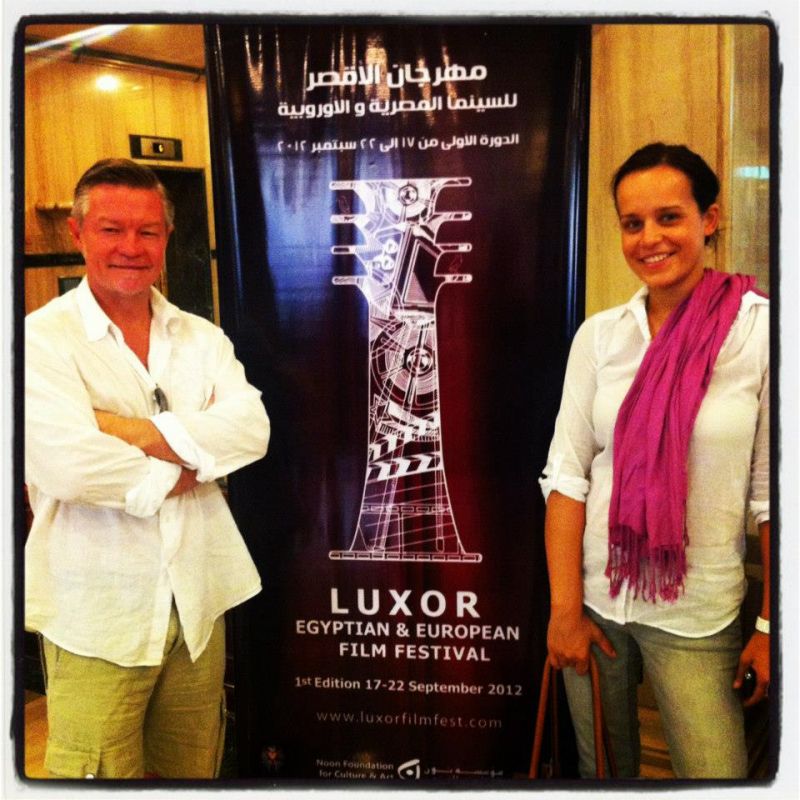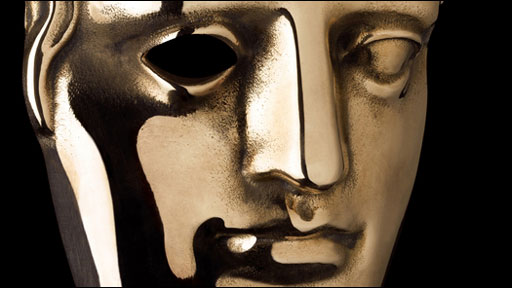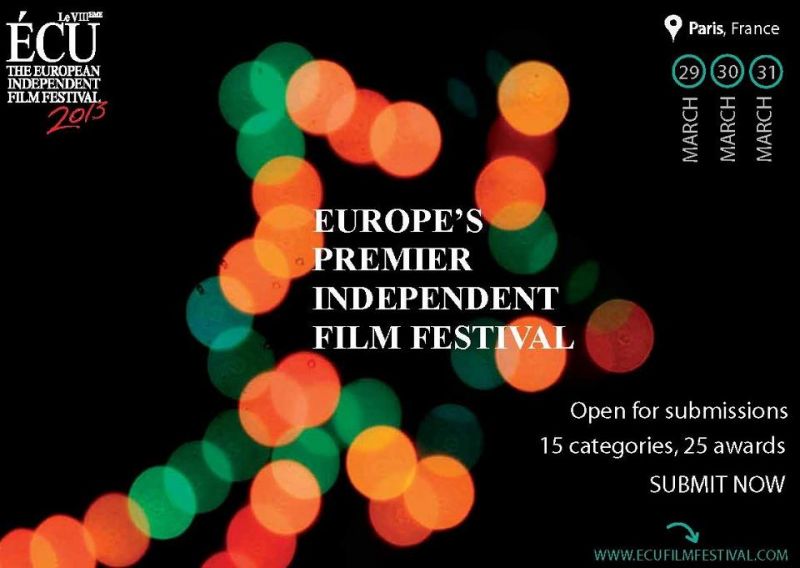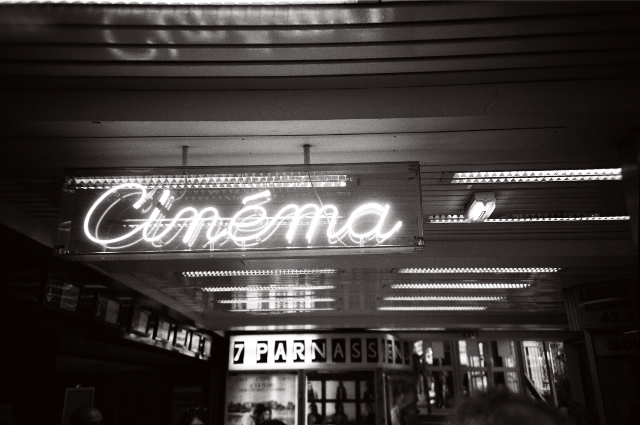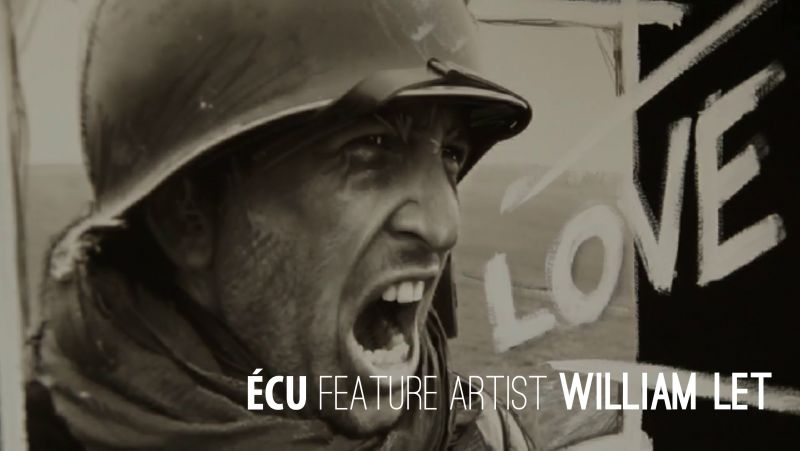|
|
||
|
Pro Tools
FILMFESTIVALS | 24/7 world wide coverageWelcome ! Enjoy the best of both worlds: Film & Festival News, exploring the best of the film festivals community. Launched in 1995, relentlessly connecting films to festivals, documenting and promoting festivals worldwide. Working on an upgrade soon. For collaboration, editorial contributions, or publicity, please send us an email here. User login |
Scott's Interview to EuroXpress
“The difference in European independent cinema is that it doesn’t leave anyone indifferent” Interview: 29th of January, 2012 We interviewed Scott Hillier, a film and documentary director, producer, and President of ÉCU- The European Independent Film Festival . By Mariana Castaño (Paris) Scott Hillier is a “storyteller”. “Storyteller” is the word he uses himself, in a manner of English that he speaks at the speed of light. His eyes and hands move quickly and without end. In just a few seconds, you can be certain that you are sitting in front of one of those people that never stops moving and has a mind in constant motion, always set on the next project. In the middle of our interview, his phone rings. He apologises and says it is urgent. The call is regarding the preparations for his next trip to Libya. There, in Libya, a new story awaits him. This story will be of Kikhia, Muammar Gaddafi’s Foreign Minister in the 1970′s and told by his daughter, Jiji. In the 1980′s Kikhia became a Gaddafi dissident and one day, twenty years ago, he disappeared without a trace from a hotel in Cairo – and presumably liquidated by Gaddafi. For Hillier, making movies and documentaries is not work, but a passion. This passion also happens to be the main source of funding for the festival he heads. He first launched his festival, ÉCU – The European Independent Film Festival seven years ago. This year, the event will take place March 30th through April 1st in Paris. Hillier’s dream would be to have the festival travel throughout Europe with its first stop, he ensures, Barcelona, Spain. However, over the past few years, the festival has not received funding from neither European or French institutions – and times are difficult. This may be because “we haven’t knocked on the right door” Hillier comments. But there are others who contribute in different ways. Hundreds of young directors participate in the ÉCU festival every year. This involvement has, step-by-step, built its position within the global independent cinema landscape. EuroXpress. - You were born in Australia. You have worked television networks such as BBC, HBO and National Geographic. In 2001, you were the Director of Photography in the HBO Twin Towers documentary and won an Oscar. Then, seven years ago, you decided to create ÉCU – European Independent Film Festival. How did this adventure emerge? S.H. – It has indeed been an adventure. When we came back from New York, after the Oscar for the Twin Towers documentary I carried on with my usual work. I travelled around the world making documentaries and news features. In addition once a month I taught at a film school here in Paris. At the end of the school term, we watched the movies made by the students and I asked them: “What do you do with your movies? Do you send them to Sundance? “ And they told me that they did not and that there wasn’t an European version of the Sundance Festival for them to participate. I thought it was a shame. At the time, I was involved with making my own independent films and one day I was trying to get some interest from the Cannes Film Festival but they explained to me that if my name wasn’t known then my movies must be worthless. It was then that I thought it would be a great idea to launch a European independent film festival because I KNEW that there were people like me out there. I figured that if a director entered the festival and won an award as director of one of Europe’s best independent film then it would open doors for them and allow them to carry on with their work. That’s what we wanted with our festival. We wanted to reach an audience for those independent films that otherwise wouldn’t have been watched. Exp. – As an independent film director, what are the main issues you have had to face? S.H. – There are people who believe that because a film has a small budget or is self-funded, that it is automatically a bad film. But this is not true because it is not necessary a big budget that makes good films. The money helps, of course, but you can tell good stories with a small budget, as well. There are plenty of very bad films despite having a big budget. The difference is that when you are using your own money, or borrowed money, you have to be creative. The films participating in the ÉCU festival are independent, they are not produced with the budget of big companies or television networks and they really are different kinds of films. You can see the passion with which they have been made, the passion they put in the telling of these stories. Mankind has been narrating stories for thousands of years, some of them succeed, others don’t. The important thing is to find your own voice as a storyteller and hope to reach an audience which allows you to create more stories. Exp. – Launching the festival mustn’t have been easy… S.H. – Everybody told me that it was impossible, that I would have to get the funding first. But I had been working for ten years as a war cameraman and don’t faze easily when faced with ‘impossibilities’. Working in Bosnia was difficult. In Chechen, it was very hard, but it neither was impossible. There are things that I can’t do, things that I wouldn’ even attempt. Brain surgery and piloting the Space Shuttle for instance. Therefore, every time theatre owners or sponsors told me that it was impossible, I continued on. I used to tell to myself: I will do it; I will accomplish my goal and it doesn’t matter if I have to do it at home with a group of friends and a couple of bottles of wine. I will create The European Independent Film Festival and I will award Europe’s Best Independent Director and Europe’s Best Independent Film because I think it is important and necessary. The first festival was challenging. I spoke with tons of people: theatre owners who asked me about what famous actors that I had on the jury, people who didn’t understand the concept that a good film is all about telling a good story. And oh my god did I meet all sorts of negative people! However, I got lucky when I met the head of the Bnf cinema department who was interested in documentaries and miraculously made a date available for us in their amazing facilities. So, we jumped at the chance with around thirty films to screen and an excellent audience. The festival was a success. Exp. – And for those who win an award at the festival – What does the award do for these filmmakers? S.H. – The award in itself is huge recognition. Imagine being named Europe’s Best Independent film director? This is a filmmakers festival and at this festival the directors and their films are what matter – this is not a red carpet event where glitz overwhelms creativity . Filmmakers have the opportunity meet each other, exchange experiences, opinions and ideas. After each screening, there is a question and answer session with the director. The festivals judging panel is made up of sixty people, from all over the world, mostly made up of ECU ALUMNI. Every year we add directors who won at the previous edition. This process works well because they know how to select the best films. Regarding the financial side of running the festival? It is REALLY difficult. It requires a big effort but at the same time the reward is the satisfaction of producing great work. Exp.- What does it mean for an independent film director to win the festival? S.H. – Last year’s winner, 27 m, by Gabriella Cserhati and Fabien Lartigue’s, has since been screened in eleven countries curtesy of ÉCU. This is in thanks to the agreements that we have with our festival partners throughout the world who support European independent cinema. The directors have been invited to Italy, Greece, and other countries to present their films and they are now meeting with sponsors for their new projects. So they get the chance to make another great film and to tell another great story. Exp.- After seven years at the forefront of the ÉCU festival, would you say that there is a specific way that makes European independent cinema different? S.H.- Europeans make films that are different. We have all grown up watching American movies. But in these seven years, I’ve come to realize that European directors are different — they have a special way of thinking. It is obvious that a Greek director differs from a Norwegian, or an Italian but those differences are enriching. One great thing that they have in common is that their films are not like American ones. Their films don’t have to have a happy or predictable ending. In the U.S., you have the pressure to make movies that make money, and I know that because I have worked there and felt that pressure. That’s why you have to enter into the established pattern because otherwise you won’t reach an audience and you won’t get the chance to get funding for another film. Of course there is some great independent cinema in the U.S. The difference there is that it is not so difficult to get funding, as it is in Europe. But in the U.S. there is a tendancy to ‘tidy-up’ the story and never leave questions without answers. In Europe, you don’t have to explain everything in the film and in that way the films here won’t be indifferent to you. At the ÉCU festival, you will never see the audience leaving the screening room silently. Immediately, they are speaking about the movies. There is always a discussion, a reaction. This is basically the difference in European cinema. It doesn’t leave you indifferent. Exp. – What is the most important aspect of the festival? S.H.- To change a person’s life, to allow the director to exist, and to make films. To allow filmmakers to keep their hopes and fulfil their need to tell stories. For me, the best moment of the festival is the reaction of the directors at the end of the event come to me and say, “Scott, excellent job.” They know that I’m not a trickster, that I don’t have money and that I won’t deceive them. The films we screen are truly independent. We always look for directors who are truly independent and produce quality work because we have a reputation that we cannot lose. The most exciting moment is when the screening has ended and you see the look of the director when all the other directors and public come to talk with him or her about their film. Exp.- Where there any moments when you were tempted to give up? S.H.- Yes, I had some moments. But, I am one of those crazies who believe that when they have something to do, they do it. Three years ago, my partner, a young person, died of cancer. That was the beginning of the international economic crisis — we didn’t have money and we had to help as much as we could financially. That was very difficult. In that moment, I really thought about giving up. But that same day, I told myself that it couldn’t happen, that I had to carry on. It is hard, but you have to do it. I believe in that and will keep on believing. The directors know that and that’s why they trust me. They know that there is a prize, even though it’s not a financial one. For example, this year one of our directors was eligible for an Oscar, others have been in the BAFTA Awards (British Academy of Film and Television Arts) and many other directors have been helped in some way. Exp.- ÉCU- The European Independent Film Festival does not have any public funding, does it? S.H.- I wish we had the support of European institutions, people who believe in us and what we do, but they seem to be VERY uninterested in us. There is a huge quantity of independent directors, some of them young, some not so young, who feel really rejected. They don’t know how to get to anybody in the European commission for funding. They are too busy being directors, storytellers, and they don’t know how to get funding from these authorities, and despite all this they will keep making films. If these institutions could help these filmmakers tell their stories, stories in which they pour their souls into then I think they would be contributing to the improvement of the European Union. We would feel proud of European producers and directors. Besides, Europe is experiencing a severe crisis, and when that happens, people tend to stay at home more and watch more movies, films, documentaries etc.. Already, as a cultural event dedicated too independent cinema we contribute – all without an ounze of support from Europe. In addition, I have a folder with 5.000 films never screened outside of the festival, why not put those films on the internet? So I did! Personally, and with my own money, I created a web-based European film channel to show what European directors are doing. People interested in cinema all know Sundance, and other independent festivals throughout the U.S, as well as major indie directors, such as Robert Rodríguez or Quentin Tarantino, but where are the European directors? I know the answer. They are sitting in my library and nobody is watching them. We need support to be able to show those films, support to show them to the world. There is always a question asked in all festivals: “How can I watch that film again, or how can I show it to my family or friends?” It is not possible. That’s why I have created a film channel, albeit a very small one. It is there for the people who look for something different and something with quality. Read the original article in Spanish here. 08.02.2012 | ÉCU-The European Independent Film Festival's blog Cat. : Australia Barcelona BBC Bnf cinema Bosnia and Herzegovina British Academy CAIRO cameraman Director director , producer, and President ecu ÉCU ecufilmfestival Entertainment Entertainment Europe European cinema European Commission European Independent Film Festival European Union euroxpress Everybody Fabien Lartigue Family Relation Film film director Film genres Foreign Minister Gabriella Cserhati Greece HBO HBO Twin Towers Head Independent film indie Italy Jiji Libya Major Mariana Castaño Mariana Castaño National Geographic New York Oscar paris Paris Quentin Tarantino Quotation Robert Rodriguez Scott Hillier Scott Hillier Spain Sundance Technology Technology the BAFTA awards the Cannes Film Festival the European Independent Film Festival the Oscar the Sundance Festival Twin Towers United States
|
LinksThe Bulletin Board > The Bulletin Board Blog Following News Interview with EFM (Berlin) Director
Interview with IFTA Chairman (AFM)
Interview with Cannes Marche du Film Director
Filmfestivals.com dailies live coverage from > Live from India
Useful links for the indies: > Big files transfer
+ SUBSCRIBE to the weekly Newsletter Deals+ Special offers and discounts from filmfestivals.com Selected fun offers
> Bonus Casino
User imagesAbout ÉCU-The European Independent Film Festival Hillier Scott Hillier Scott (ECU)
Scott Hillier, Founder and President of ÉCU - The European Independent Film Festival
Scott Hillier is a director, cinematographer, and screenwriter, based in Paris, France. In the last 20 years, Hillier has gained international recognition from his strong and incredible cinematography, editing, writing, producing and directing portfolio in both the television and film industries.
Scott began his career in the television industry in Australia. In 1988, he moved to London getting a job with the BBC who then set him to Baghdad. This opportunity led him to 10 years of traveling around world for the BBC, mainly in war zones like Somalia, Bosnia, Tchetcheynia, Kashmir, and Lebanon. After a near fatal encounter with a Russian bomber in Tchechnyia, Hillier gave up his war coverage and began in a new direction.
He moved to New York City in 1998. He directed and photographed eight one-hour documentaries for National Geographic and The Discovery Channel. Based on his war knowledge and experience, Hillier wrote and directed a short film titled, “Behind the Eyes of War!" The film was awarded “Best Short Dramatic Film” at the New York Independent Film and TV Festival in 1999. From that he served as Supervising Producer and Director for the critically acclaimed CBS 42 part reality series, "The Bravest” in 2002 and wrote and directed a stage play called, "Deadman’s Mai l," which ran at Le Théâtre du Moulin de la Galette in Paris during the summer of 2004. He then became the Director of Photography on a documentary titled, “Twin Towers." This was yet another life changing experience for Hillier. The riveting documentary won an Academy Award for "Best Documentary Short Subject" in 2003. In 2004, Hillier changed continents again, spending three months in Ethiopia. He produced “Worlds Apart,” a pilot for ABC America / True Entertainment / Endemol. As you can see, Hillier was and is always in constant movement and enjoys working in a number of diverse creative areas including documentaries, music videos, commercials, feature and short films.
Scott studied film at New York University and The London Film and Television School. He also studied literary non-fiction writing at Columbia University. Hillier's regular clients include the BBC, Microsoft, ABC, PBS and National Geographic. Between filming assignments, he used to teach film, a Masters Degree course in Screenwriting at the Eicar International Film School in Paris, France and journalism at the Formation des Journalistes Français in Paris, France.
View my profile Send me a message The EditorUser contributionsUser links |




















